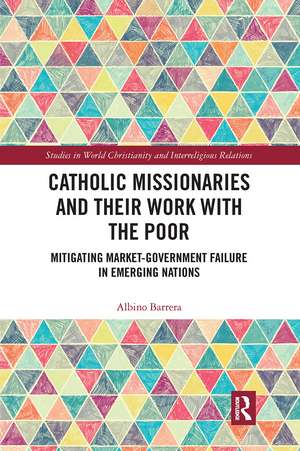Catholic Missionaries and Their Work with the Poor: Mitigating Market-Government Failure in Emerging Nations: Studies in World Christianity and Interreligious Relations
Autor Albino Barreraen Limba Engleză Paperback – 30 sep 2020
This study has two main objectives. First, it aims to present an overview of missionaries’ development work, evaluating the socioeconomic significance of their faith-based development work. In addition, various comparative advantages and disadvantages have been imputed to FBOs in the religion-development literature, and we assess to what extent missionaries actually exhibit these posited qualities in practice. Second, the groundwork is laid for future religion-development scholars by presenting a theoretical framework and a method for evaluating the role and contributions of FBOs in the larger community.
This is an important investigation of contemporary worldwide Christianity and its relationship with development. As such, it will interest scholars of religious studies and missiology, as well as development economics, public service and the political economy.
| Toate formatele și edițiile | Preț | Express |
|---|---|---|
| Paperback (1) | 273.65 lei 6-8 săpt. | |
| Taylor & Francis – 30 sep 2020 | 273.65 lei 6-8 săpt. | |
| Hardback (1) | 1002.63 lei 6-8 săpt. | |
| Taylor & Francis – 11 dec 2018 | 1002.63 lei 6-8 săpt. |
Preț: 273.65 lei
Preț vechi: 342.22 lei
-20% Nou
Puncte Express: 410
Preț estimativ în valută:
52.36€ • 54.78$ • 43.50£
52.36€ • 54.78$ • 43.50£
Carte tipărită la comandă
Livrare economică 02-16 aprilie
Preluare comenzi: 021 569.72.76
Specificații
ISBN-13: 9780367663582
ISBN-10: 0367663589
Pagini: 276
Dimensiuni: 156 x 234 x 19 mm
Greutate: 0.51 kg
Ediția:1
Editura: Taylor & Francis
Colecția Routledge
Seria Studies in World Christianity and Interreligious Relations
Locul publicării:Oxford, United Kingdom
ISBN-10: 0367663589
Pagini: 276
Dimensiuni: 156 x 234 x 19 mm
Greutate: 0.51 kg
Ediția:1
Editura: Taylor & Francis
Colecția Routledge
Seria Studies in World Christianity and Interreligious Relations
Locul publicării:Oxford, United Kingdom
Public țintă
Postgraduate and UndergraduateCuprins
Prolegomena 1 Missionary Healthcare Services and their Outreach to the Ultra-Poor 2 Missionary Educational Initiatives for Children and Youth at-Risk 3 Missionary Social Services and their Positive Externalities for Development 4 Missionaries’ "Last-Mile" Comparative Advantages 5 Summary and Evaluation
Notă biografică
Albino Barrera is Professor of Economics and Theology at Providence College, USA. His research mainly focusses on moral theology, economic ethics, and the intersection of development economics and religion, and he has published multiple books and journal articles on these subjects. These include, Biblical Economic Ethics (2013) and Market Complicity and Christian Ethics (2011).
Recenzii
"[A]n important study . . . where until now there has been a lack of systematic research. . . . [S]urely all programs for cross-cultural missioners . . . could make use of this pioneering study. More generally, this volume should make the reading lists of courses in socio-economic development at institutes of higher education."
Mission Studies 37(2020), p. 312-313
"Well-constructed and clearly written, this study opens up new dimensions of documentation and analysis, which . . . could be extended to the action of other churches as well as non-Christian religious organizations."
Nouvelle Revue Théologique 141:4 (2019), p. 665
Mission Studies 37(2020), p. 312-313
"Well-constructed and clearly written, this study opens up new dimensions of documentation and analysis, which . . . could be extended to the action of other churches as well as non-Christian religious organizations."
Nouvelle Revue Théologique 141:4 (2019), p. 665
Descriere
This book explores the vital role of faith-based organizations (FBOs) in compensating for the market’s and government’s inability to provide vital services. Its key theoretical contribution is the notion that poverty is the result of a triadic failure—when markets, government, and civil society become dysfunctional at the same time.














